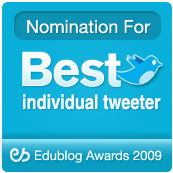 Image: Michael Hartford via Flickr
Image: Michael Hartford via FlickrVicki Davis' post today on the rise of applications with semantic awareness again raises the question of how our digital trail will be judged by others and who we will be, digitally.
Many of us who actively participate in creating digital content have had a moment in which we were surprised – and then not surprised – to find that someone knew something about us that we didn't expect them to.
We're used to our digital trail being disparate and a bit obfuscated... lots of different sites, passwords, comments, images, etc. etc., each in its own little "slot." When the pieces get connected despite that, it sometimes takes some getting used to.
Teenagers have been accustomed to adults being somewhat "mindblind" to their digital trail, since much of it is generated in spaces (they think) adults don't frequent or understand.
But as tools like Typealyzer become more sophisticated and ubiquitous (and as the age of social media partipants continues to rise), there's a good chance we're all going to be deepening our understanding of just how public our shared information is. And the background checks offered by companies like Intelius may begin offering some very different types of background information.
And if you were the dean of admissions at an art school, and someone offered you a product that, based on the latest digital mining techniques, could give you a detailed analysis of a student's visual style without the student submitting a formal portfolio... well, would you be interested?
What about information that claimed to help you assess how an individual student typically responds to challenge?
Colleges already enable students to create "admissions application activity accounts" as early in their college searches as they wish; will they also be looking to collect less explicitly relevant information at some point? Seems like it's getting easier by the day.
Gary Vee thinks that all this information is going to make it easier for people's true nature – good or bad – to show through. What do YOU think?
Many of us who actively participate in creating digital content have had a moment in which we were surprised – and then not surprised – to find that someone knew something about us that we didn't expect them to.
We're used to our digital trail being disparate and a bit obfuscated... lots of different sites, passwords, comments, images, etc. etc., each in its own little "slot." When the pieces get connected despite that, it sometimes takes some getting used to.
Teenagers have been accustomed to adults being somewhat "mindblind" to their digital trail, since much of it is generated in spaces (they think) adults don't frequent or understand.
But as tools like Typealyzer become more sophisticated and ubiquitous (and as the age of social media partipants continues to rise), there's a good chance we're all going to be deepening our understanding of just how public our shared information is. And the background checks offered by companies like Intelius may begin offering some very different types of background information.
And if you were the dean of admissions at an art school, and someone offered you a product that, based on the latest digital mining techniques, could give you a detailed analysis of a student's visual style without the student submitting a formal portfolio... well, would you be interested?
What about information that claimed to help you assess how an individual student typically responds to challenge?
Colleges already enable students to create "admissions application activity accounts" as early in their college searches as they wish; will they also be looking to collect less explicitly relevant information at some point? Seems like it's getting easier by the day.
Gary Vee thinks that all this information is going to make it easier for people's true nature – good or bad – to show through. What do YOU think?







No comments:
Post a Comment